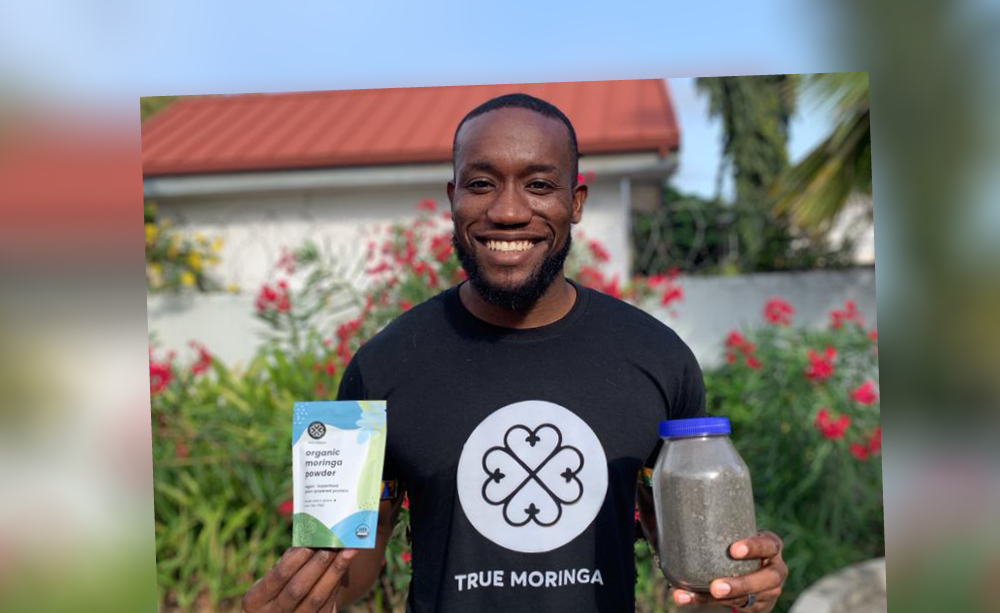Alum Aims to Prove that Money Does Grow on Trees
-
-
Slice of MIT
Filed Under
Recommended

As a young boy growing up in Ghana, Kwami Williams ’12 loved breaking things down to see how the parts fit together.
“I was the nerdy kid that broke everyone’s toys trying to figure out how they worked,” says Williams. “I was born with the desire to tinker.”
Decades later, Williams has brought that analytical thinking to a supply chain for products from the moringa tree—a drought-resistant tree that grows wild or is cultivated in the tropics and is known worldwide for its healing properties.
“We like to joke that our goal is to prove that money does grow on trees, that it grows on moringa trees,” says the cofounder and CEO of MoringaConnect.
Moringa tree leaves have more iron than spinach, more calcium than milk, and more protein than yogurt. The seeds are filled with an oil more moisturizing than coconut or shea. So Williams, with company cofounder Emily Cunningham, set up the Ghana-based MoringaConnect, which supports farmers in growing and harvesting these leaves and seeds. The company provides access to training, financing, a guaranteed market, and technology―and then transforms farmers’ harvest into seed oil and nutritional leaf powder for use in beauty and health-product brands worldwide. Williams and Cunningham distribute to retailers (like Whole Foods Market and Macy’s) through their branded product line True Moringa, giving farmers access to a global market for their products.
Though Williams spent his early childhood in Ghana, he had not encountered the moringa tree before his family’s move to the United States during his fourth-grade year. His first experience with the “miracle tree” was through a trip to Ghana with his MIT D-Lab class, which focuses on working with people in the developing world to co-create solutions to poverty.
Williams says he observed that a lot of people already had Moringa trees, but they didn’t have the resources to tap into the industry. “I found that farmers with an incredible tree of promise in their backyards were disconnected from the marketplace that would allow them to increase their incomes and improve their lives through it.”
Williams and Cunningham, his D-Lab class partner and eventual MoringaConnect cofounder, focused their class project on building moringa processing technologies and a supply chain network in partnership with these farmers. At the end of the semester, they were awarded a $5,000 Scale-Up grant from D-Lab to turn their idea into a viable business. Williams moved to Ghana after his graduation in 2012, and Cunningham joined forces with him after her graduation in 2013 to register and officially launch MoringaConnect.
Over 5,000 farmers grow moringa and supply us here in Ghana. On average, each of them has about five different household members as part of their family. So, we’re directly impacting about 25,000 people...
The company aims to be more than just a doorway to the global market. It also provides a suite of wraparound services to improve the lives of the farmers.
“Over 5,000 farmers grow moringa and supply us here in Ghana,” says Williams. “On average, each of them has about five different household members as part of their family. So, we’re directly impacting about 25,000 people through the work that we do.”
They have organized village savings and loan associations to help farmers build capital, have created childcare centers that allow women to work, raised grant funds for digging clean-water wells, renovated and modernized local medical centers, and awarded multiple university scholarships.
Becoming the CEO of a supply chain and wellness business was not on Williams’s radar when he started at MIT as an aerospace engineering major. Throughout his childhood, he loved all things that flew. He even got to fulfill his dream of working at NASA as an intern the summer after his first year at the Institute—but the experience left him wanting more.
“I was sitting next to a shuttle robotic arm, working on and programming it, writing software to help it dock to the International Space Station,” he says. “But while at NASA doing the thing I’ve always dreamt about doing, I still felt like there was something missing. I couldn’t quite place my finger on it.”
When he returned to Ghana after his sophomore year as part of a mission trip led by MIT Cru, a Christian student group, he realized what it was. While there, he saw so many people trying to make ends meet—real people living in poverty, not just faceless statistics.
“I started asking myself, ‘If aerospace engineers can help put a man on the moon, then what can I start doing by leveraging my education at MIT to have a more direct impact in the lives of the rural poor?’” he says.
He restructured his major, adding a concentration in global development and discovered D-Lab during his senior year.
Williams credits the support he got as a student at MIT for his knowledge that he could build a successful business at a young age and use that business to change people’s lives.
“MIT believes that you can change the world even as a student. It doesn’t matter who you are, how old you are—you have value to contribute to making the world better,” says Williams. “There’s a beautiful African proverb that says, ‘If you want to go fast, you should go alone. But if you want to go far, then you should go together.’ I think, in so many ways, MIT embodied that.”
Photo: Courtesy of True Moringa.







